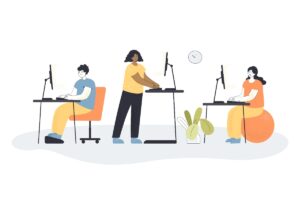Relationships and resilience are entwined.
One of the things that fascinates and inspires us is how interconnected the foundations that support our Mental Fitness can be. They interweave like the poles of a tent, with each of the other poles strengthening the other.
Sleep helps support our stress. Motivation helps our happiness. Optimism drives our confidence. And relationships are a fundamental foundation for our resilience.
A recent study looking at different responses to lockdown during Covid found that people with greater social connectedness reported lower levels of perceived stress, worry and fatigue whilst other studies have shown long term links between social connectedness and reduced risks of depression.
Relationships are one of our deepest sources of motivation and purpose in life and work.
For many of us, our family, our friends, our colleagues and the people we work with are our purpose whether that is in being able to care for them and help them achieve their goals, feel their pride in us achieving more external goals or simply working towards spending more time with them.
Connection and relationship are our source of support and a way to share our burdens.
As well as supporting our broader sense of purpose, relationships are about the small things, being heard, being supported, a sense that someone or someones have your back. A problem shared is a problem halved.
In one of our recent Mental Fitness workshops, a well-established operational team reflected on what they found difficult and how they wanted to develop their collective resilience.
Many of the team echoed each other’s sentiments until one person, and then another commented “I didn’t know you felt that way too”, “Why don’t we talk like this in our team meetings?”, “I feel better already”. That simple act of sharing, talking, being heard, being accepted and offered support, builds resilience.
“When I say it out loud, and hear my colleagues talking about similar difficulties, they don’t seem so impossible. When it’s outside, in other people as well as in me, it’s easier to recognise and understand why we’re struggling” (workshop participant)
So relationships are vital to our individual Mental Fitness and our resilience as individuals and organisations. But it has often been overlooked.
“Lost in the mix of resiliency research is the importance of social circumstances. How resilient we are may have as much or more to do with our social milieu and circle of support—our communities, our institutions, our cultural expectations—as it does with our personal strengths.” Jill Suttie, Greater Good Magazine
Focusing on how we can cultivate relationships as individuals is vital.
So if we recognise the importance of connection and relationships, how can we cultivate them, nurture them and grow more of them in our lives and work?
As individuals it can start with valuing what we have. Reflecting on who supports us and how. Being aware of where our support comes from is the first step in appreciating it and feeling confident in its presence. It can also be the first step in recognising where we don’t have support or could perhaps benefit from more of it.
Which can lead to a second step of actively working on building our connections and relationship network. Some people semi jokingly refer to this as developing their own “board of directors”. Consciously building a network of people around us who are aware of the supportive role they can play in different areas of our lives.
The third step involves ensuring that we make time to develop these relationships and to provide the two way flow of support they entail. If connection is just seen as “part of the background of our lives” making that time can feel more like a luxury. When we realise the value and importance it plays in sustaining our resilience and underpinning our performance then making that time can feel more like a part of our working life or an investment in ourselves.
And so is cultivating connection and relationships as an organisation
Recognising the importance of relationships for Mental Fitness and resilience as Leaders in our organisations means we can find ways to support it. So how can we create connections organisationally?
Firstly we can celebrate their importance. Talking about and valuing all the ways colleagues support each other in small ways on a daily basis gives connection ‘permission to flourish.’
Secondly we can create spaces for it to grow. One of the challenges of hybrid working can be that some of the informal spaces where connection flourishes – coffee chats, corridor encounters, chatting at desks – are no longer present. How can your organisation replace these? Can there be time after every meeting for people to linger and discuss challenges? Can you create “coffee meets?” Can you form “interest groups” around typical challenges people may have like parenting and working?
And thirdly we can support people in creating their own “board of directors” by helping add people into the mix. Mentoring has a valuable role to play as a key connection that can both provide support within that relationship and aid reflection on the importance of support from other connections, or ways to build networks to get a wider “support team” in place.
As Brene Brown puts it in her classic book on Leadership, Daring Greatly, “Connection is why we’re here; it is what gives purpose and meaning to our lives”. It plays a vital role in Mental Fitness. Finding ways to nurture it and aid its growth is vital too.
Want to create deeper relationships?
If your organisation is aiming to be in the vanguard of putting Mental Fitness at the heart of organisational development and you’d like help to take this further, we’d love to talk and we’d love to hear your ideas about building better relationships as an individual and an organisation.
Read: Check out our post on building a wellbeing strategy in your organisation. Click here.
Coach: Experience Transformational Coaching for yourself with a FREE 1 hour coaching session with one of our highly experienced Coaches. Click here.
Audit: Use our scorecard tool to identify key areas of focus for your organisation.
Consult: Book a free 1hr chat with one of our consultants to talk more about wellbeing strategy and help focus action. Click here.
























